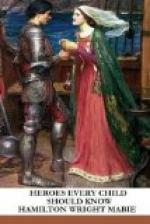Nevertheless as time passed the Crusaders fared somewhat better, for they drew more together, and the enemy, seeing that they still held their ground, and being themselves not a little weary, drew back. In the end the King and such of the chiefs as were left got back into the camp. Right glad they were to rest, for the battle had been long and fierce.
But they had but little peace, for that very night the Saracens made an attack upon the camp. A great disturbance they made, and most unwelcome to men who had been fighting all the day. But they did not work much harm. Many valiant deeds were done by the Christians.
But the Saracens were making ready for attacking the camp with more force than before. And their leader could be seen from the camp, taking account of the Crusaders, and strengthening his battalions where he thought that the King’s camp might be most conveniently assailed.
The first attack was made on the Count of Anjou. He held that part of the camp that was nearest to the city of Cairo. Some of the enemy were on horseback and some on foot; there were some also that threw Greek fire among the count’s men. Between them they pressed the count so sorely that he was fain to send to the King for help. This the King gave without loss of time; he led the men himself, and it was not long before they chased the Saracens from this part of the field.
When the battle was over the King called the barons to his tent, and thanked them for all that they had done, and gave them great encouragement, saying that as they had driven back the Saracens over and again, it would, beyond doubt, go well with them in the end.
And now the army was sore distressed for want both of food and of water. In Damietta, indeed, there were yet stores of barley, rice, and other grains; but in the camp scarce anything that could be eaten. Some small fishes were caught in the river; but these were very ill savoured, and all the more so—so, at least, it seemed to such as eat them under constraint of hunger—because they fed on dead bodies, of which many were thrown into the river. For a while some portion of the stores that were in the city were carried across the river to the camp. But this the Saracens hindered, for by this time their ships had the mastery over the ships of the Christians. They kept, therefore, the river, suffering nothing to pass. If anything was carried across, it was but a trifle. Some things the country people brought into the camp, but these were not to be purchased save for large sums of money, and money was by this time scarce even among the richer sort. And when it was judged expedient that the King’s army should cross the river again and return to the camp, things were worse rather than better, so far as victuals were concerned. It was well that the army should be brought together, both for attack and for defence, but with the greater multitude the famine grew worse and worse.




